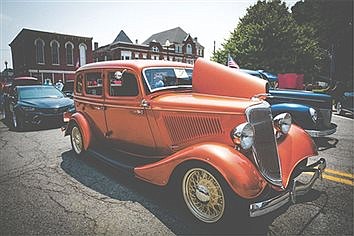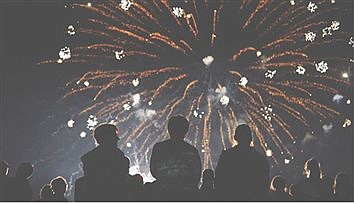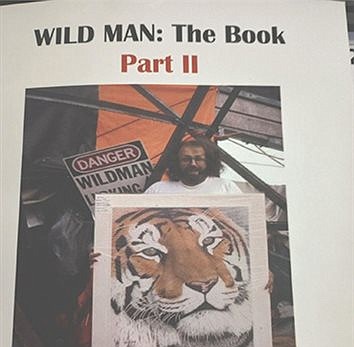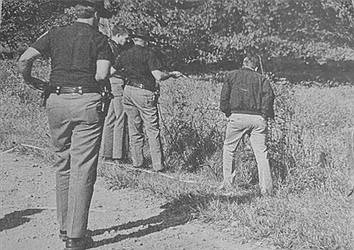Indiana’s important history with Dr. Martin Luther King, Jr.
January 11, 2023 at 6:16 p.m.

Dr. Martin Luther King Jr. was born on January 15, 1929, in Atlanta, Georgia. After the Montgomery Bus Boycotts of 1955, he was suddenly in the national spotlight, and became the crux of the Civil Rights Movement. King traveled around the country in support of the movement, and came to Indiana many times. On Dec. 12, 1958, Dr. King came to speak at the Senate Avenue YMCA's “Monster Meeting” in front of a crowd of 4,000 at the Cadle Tabernacle, a church at the corner of New Jersey and Ohio streets in Indianapolis. He was 29 at the time, and had only 10 years left to live.
King had been stabbed by a would-be assassin just three months prior to his Indiana trip, but local newspapers noted that he still arrived in an unassuming and unguarded way. “We were surprised to learn Dr. King was traveling alone,” a Recorder reporter wrote at the time. “No bodyguard, not even a secretary. Just got on the plane and flew to Indianapolis.”
Once in Indy, Dr. King spoke to the overflowing crowd about striving for excellence. “If you are going to be a tree, be the best tree in the forest,” he said. “If you are going to be a leaf on that tree, be the very best leaf. Whatever you are going to be, be the best.” King also urged listeners to remain peaceful in their protests for civil rights, and to choose love over hate. “We must learn to live together as brothers," he said, "or we will die as fools."
On April 4, 1968, King was shot to death outside of his hotel room in Memphis. Less than 500 miles away, presidential candidate Robert F. Kennedy was speaking to a large group in Indianapolis. Kennedy announced Dr. King's death there, and again called on the people to remain peaceful, even in light of the tragic news. As riots broke out in major cities around the country, Indianapolis stayed steadfast in their peaceful demonstrations of grief, something many attribute to Kennedy's presence and words at the time.
Attempts to make Martin Luther King Jr.'s birthday a federal holiday failed for 15 years following his assassination. In 1983, late Indiana Congresswoman Katie Beatrice Hall finally won her battle to commemorate King's birthday as a federal holiday. Hall was the first African American to be elected into the U.S. Congress in Indiana, and tirelessly sponsored the bill to create the national holiday. "The time is before us to show what we believe — that justice and equality must continue to prevail, not only as individuals, but as the greatest nation in this world," Hall said in the Indianapolis News. President Ronald Reagan signed the bill into law a month later, proclaiming a federal Martin Luther King Jr. Day every third Monday in January.
Latest News
E-Editions
Events
Dr. Martin Luther King Jr. was born on January 15, 1929, in Atlanta, Georgia. After the Montgomery Bus Boycotts of 1955, he was suddenly in the national spotlight, and became the crux of the Civil Rights Movement. King traveled around the country in support of the movement, and came to Indiana many times. On Dec. 12, 1958, Dr. King came to speak at the Senate Avenue YMCA's “Monster Meeting” in front of a crowd of 4,000 at the Cadle Tabernacle, a church at the corner of New Jersey and Ohio streets in Indianapolis. He was 29 at the time, and had only 10 years left to live.
King had been stabbed by a would-be assassin just three months prior to his Indiana trip, but local newspapers noted that he still arrived in an unassuming and unguarded way. “We were surprised to learn Dr. King was traveling alone,” a Recorder reporter wrote at the time. “No bodyguard, not even a secretary. Just got on the plane and flew to Indianapolis.”
Once in Indy, Dr. King spoke to the overflowing crowd about striving for excellence. “If you are going to be a tree, be the best tree in the forest,” he said. “If you are going to be a leaf on that tree, be the very best leaf. Whatever you are going to be, be the best.” King also urged listeners to remain peaceful in their protests for civil rights, and to choose love over hate. “We must learn to live together as brothers," he said, "or we will die as fools."
On April 4, 1968, King was shot to death outside of his hotel room in Memphis. Less than 500 miles away, presidential candidate Robert F. Kennedy was speaking to a large group in Indianapolis. Kennedy announced Dr. King's death there, and again called on the people to remain peaceful, even in light of the tragic news. As riots broke out in major cities around the country, Indianapolis stayed steadfast in their peaceful demonstrations of grief, something many attribute to Kennedy's presence and words at the time.
Attempts to make Martin Luther King Jr.'s birthday a federal holiday failed for 15 years following his assassination. In 1983, late Indiana Congresswoman Katie Beatrice Hall finally won her battle to commemorate King's birthday as a federal holiday. Hall was the first African American to be elected into the U.S. Congress in Indiana, and tirelessly sponsored the bill to create the national holiday. "The time is before us to show what we believe — that justice and equality must continue to prevail, not only as individuals, but as the greatest nation in this world," Hall said in the Indianapolis News. President Ronald Reagan signed the bill into law a month later, proclaiming a federal Martin Luther King Jr. Day every third Monday in January.





